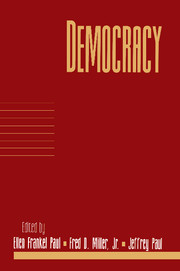Book contents
- Frontmatter
- Contents
- Introduction
- Acknowledgments
- Contributors
- The Very Idea of Popular Sovereignty: “We the People” Reconsidered
- Quasi-Rights: Participatory Citizenship and Negative Liberties in Democratic Athens
- Is There a Duty to Vote?
- Postmodern Liberalism and the Expressive Function of Law
- Democratic Epistemology and Accountability
- Political Quality
- Why Deliberative Democracy Is Different
- The Institutions of Deliberative Democracy
- Democracy as a Telos
- Radical Democracy, Personal Freedom, and the Transformative Potential of Politics
- Democracy and Value Pluralism
- The Problem of Russian Democracy: Can Russia Rise Again?
- Index
Radical Democracy, Personal Freedom, and the Transformative Potential of Politics
Published online by Cambridge University Press: 03 May 2010
- Frontmatter
- Contents
- Introduction
- Acknowledgments
- Contributors
- The Very Idea of Popular Sovereignty: “We the People” Reconsidered
- Quasi-Rights: Participatory Citizenship and Negative Liberties in Democratic Athens
- Is There a Duty to Vote?
- Postmodern Liberalism and the Expressive Function of Law
- Democratic Epistemology and Accountability
- Political Quality
- Why Deliberative Democracy Is Different
- The Institutions of Deliberative Democracy
- Democracy as a Telos
- Radical Democracy, Personal Freedom, and the Transformative Potential of Politics
- Democracy and Value Pluralism
- The Problem of Russian Democracy: Can Russia Rise Again?
- Index
Summary
INTRODUCTION
In recent years, theorists of radical democracy have criticized the liberal pluralist model of politics, a model which views the political forum primarily as a space for bargaining and the aggregation of individual preferences. While conceding that some measure of bargaining and preference aggregation is probably an ineliminable feature of democratic politics, radical democrats have charged that this model underestimates or ignores the transformative effects of democratic political interaction. In particular, liberal pluralism does not allow for the possibility that democratic politics can generate new forms of solidarity, enhance personal freedom, and inculcate virtue.
This is an important critique, and so far it has not received the attention it deserves from liberal pluralists. In this essay, I want to examine critically one set of arguments advanced by radical democrats. These arguments concern the claim that there is a tight connection between participation in democratic politics and personal freedom, a connection that is missed by liberal pluralist writers. I will argue that this claim is deeply problematic, and that there are good reasons for holding on to the liberal pluralist view that if there is any connection between personal freedom and participation in democratic politics, it is a weak and contingent one at best.
- Type
- Chapter
- Information
- Democracy , pp. 225 - 254Publisher: Cambridge University PressPrint publication year: 2000



